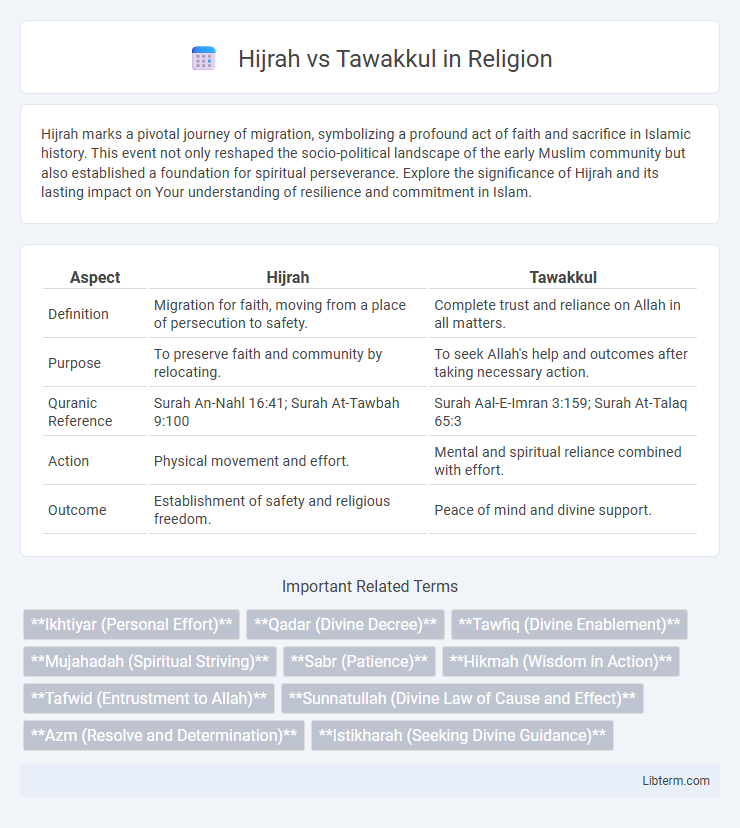Hijrah marks a pivotal journey of migration, symbolizing a profound act of faith and sacrifice in Islamic history. This event not only reshaped the socio-political landscape of the early Muslim community but also established a foundation for spiritual perseverance. Explore the significance of Hijrah and its lasting impact on Your understanding of resilience and commitment in Islam.
Table of Comparison
| Aspect | Hijrah | Tawakkul |
|---|---|---|
| Definition | Migration for faith, moving from a place of persecution to safety. | Complete trust and reliance on Allah in all matters. |
| Purpose | To preserve faith and community by relocating. | To seek Allah's help and outcomes after taking necessary action. |
| Quranic Reference | Surah An-Nahl 16:41; Surah At-Tawbah 9:100 | Surah Aal-E-Imran 3:159; Surah At-Talaq 65:3 |
| Action | Physical movement and effort. | Mental and spiritual reliance combined with effort. |
| Outcome | Establishment of safety and religious freedom. | Peace of mind and divine support. |
Understanding Hijrah: A Spiritual Migration
Hijrah represents a profound spiritual migration symbolizing the believer's conscious shift from a life of ignorance to one rooted in faith and obedience to God. This transformative journey goes beyond physical relocation, embodying an inner commitment to spiritual growth and renewal, essential for personal development in Islam. Tawakkul complements hijrah by emphasizing complete trust and reliance on God's wisdom and guidance throughout this migration process.
Defining Tawakkul: Trusting in Allah
Tawakkul is the Islamic concept of placing complete trust and reliance on Allah while taking the necessary actions in life, reflecting deep faith in His wisdom and decree. It emphasizes surrendering outcomes to Allah, believing that He controls all matters beyond human effort. Unlike Hijrah, which involves physical migration for religious reasons, Tawakkul is a spiritual practice centered on trusting Allah's plan in all circumstances.
Historical Foundations of Hijrah
The Hijrah marks a pivotal moment in Islamic history, symbolizing the Prophet Muhammad's migration from Mecca to Medina in 622 CE, which laid the foundation for the Islamic calendar and the establishment of the first Muslim community state. This event exemplifies strategic migration under persecution, contrasting with Tawakkul, which emphasizes reliance on divine will without an immediate physical relocation. The historical foundation of Hijrah underscores proactive faith through meaningful action, blending trust in Allah with decisive social and political movement.
Tawakkul in Islamic Teachings
Tawakkul in Islamic teachings emphasizes complete trust and reliance on Allah after taking appropriate means, highlighting the balance between effort and divine dependence. It reflects the believer's conviction that success and protection come only through Allah's will, fostering patience and resilience during trials. Tawakkul complements Hijrah by guiding Muslims to depend on Allah's guidance and support after migrating or undertaking significant life changes.
Hijrah: External Action or Internal Transformation?
Hijrah represents an external action involving physical migration to seek a better environment in line with faith, while Tawakkul embodies internal transformation through deep trust and reliance on God. The significance of Hijrah in Islamic history highlights the proactive steps taken to escape oppression and establish a community grounded in spiritual principles. This outward movement complements the inward spiritual reliance characterized by Tawakkul, demonstrating the balance between action and faith in Islamic teachings.
Tawakkul: Active Reliance or Passive Waiting?
Tawakkul in Islamic teachings emphasizes active reliance on Allah combined with sincere effort rather than passive waiting, encouraging believers to undertake sincere actions while maintaining trust in divine wisdom. Unlike Hijrah, which involves a physical migration for spiritual and social transformation, Tawakkul focuses on an internal state of surrender that motivates proactive behavior aligned with faith. Scholars highlight that Tawakkul integrates both faith-driven initiative and acceptance of outcomes, representing a dynamic balance between human agency and divine trust.
Key Differences Between Hijrah and Tawakkul
Hijrah refers to the physical migration or journey undertaken by the Prophet Muhammad and his followers from Mecca to Medina, symbolizing a proactive step to seek safety and religious freedom, while Tawakkul signifies placing complete trust and reliance on Allah's will in all matters. The key difference lies in Hijrah being an active, external action requiring courage and planning, whereas Tawakkul is an internal, spiritual state of surrender and faith in divine providence. Hijrah addresses changing one's environment to fulfill religious obligations, and Tawakkul focuses on maintaining patience and confidence in God's plan regardless of circumstances.
When Hijrah Meets Tawakkul: Interconnected Concepts
Hijrah, the strategic migration for preserving faith, embodies proactive effort while Tawakkul signifies deep trust in divine guidance, creating a balance between action and reliance on God. When Hijrah meets Tawakkul, believers engage in purposeful movement supported by unwavering spiritual assurance, demonstrating a dynamic interplay of human initiative and divine dependence. This interconnectedness highlights that rightful success involves both planning one's path and entrusting outcomes to God's wisdom.
Lessons from the Prophet’s Hijrah and Tawakkul
The Prophet Muhammad's Hijrah exemplifies the profound lesson of combining strategic action with Tawakkul, reflecting firm trust in Allah while undertaking necessary efforts. This migration teaches Muslims to plan wisely and take decisive steps in the face of challenges, relying on Allah's support without succumbing to complacency. The integration of Hijrah and Tawakkul remains a timeless model for balancing human endeavor and divine reliance in Islamic teachings.
Practical Applications in Modern Muslim Life
Hijrah, the act of migration for preserving faith, encourages Muslims today to take proactive steps in seeking environments that nurture spiritual growth and safety, such as relocating for education or employment aligned with Islamic values. Tawakkul emphasizes reliance on Allah while taking responsible actions in daily life, inspiring believers to balance trust in divine decree with personal effort in career, health, and social responsibilities. Together, Hijrah and Tawakkul provide a framework for modern Muslims to navigate challenges by combining practical decision-making with unwavering faith.
Hijrah Infographic

 libterm.com
libterm.com